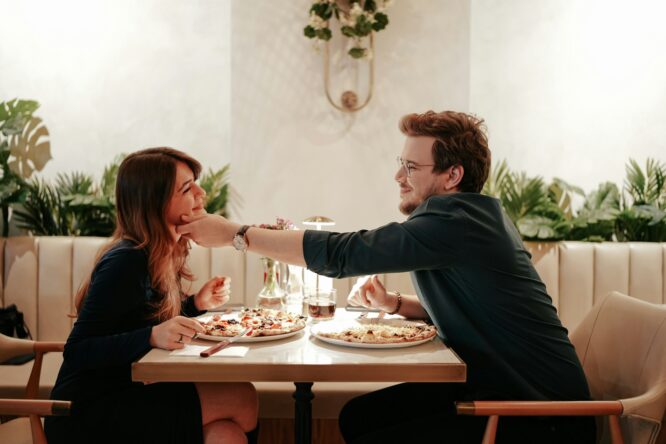Old friends are something worth treasuring, but they’re also pretty weird.

You can be a full-on adult, handling bills and back pain, but the second you’re back with certain people from your past, you start acting like you’re 16 again—and not always in a good way. Here’s why those familiar faces bring out all your old teenage nonsense, even when you thought you’d grown out of it.
You go straight back to your old role.

You might’ve changed loads since school, but some people just have a way of dragging you back to your old spot in the group. Maybe you were the quiet one, the joker, the one who got walked all over. Whatever it was, it tends to stick, even if you’re not that person anymore.
It’s not always anyone’s fault. It’s just what happens when a dynamic gets baked in early. You show up thinking you’ll just hang out, and before you know it, you’re cracking the same jokes or biting your tongue in the same way you used to.
The jokes never moved on.

There’s comfort in reminiscing, but sometimes the humour gets stuck. You end up laughing at the same stories for the fiftieth time or joking about stuff that now just feels… a bit off. Some of it hasn’t aged well, and some of it you wouldn’t even say out loud now.
However, the group doesn’t really notice. It’s like everyone just agrees to time travel back to 2008, whether it makes sense or not. You might go along with it, but deep down, it leaves you wondering if this is still the kind of connection you want.
You react like you used to, even if you don’t mean to.

You think you’re chill, you think you’ve matured, and then someone makes a slightly annoying comment and suddenly, your inner 17-year-old is rolling their eyes or getting snarky. It’s wild how quickly old reactions come back.
It’s not that you haven’t grown—it’s just that your brain recognises the situation and goes, “Oh right, we know how to handle this,” and reaches for the old script. It doesn’t matter if you’ve spent years being more thoughtful or patient—those old reflexes still live somewhere in you.
Nostalgia gets in the way of reality.

When you’ve known someone forever, it’s easy to see the past more than the present. You remember the good times, the inside jokes, the chaos, and you sort of gloss over anything that feels a bit off now. So, even if the friendship isn’t really working anymore, or they say things that make you uncomfortable, you might ignore it. Because you’re not just reacting to who they are now—you’re reacting to the version of them that made you laugh on a random Tuesday when you were both skint and bored.
You pretend you haven’t changed.

Sometimes you find yourself playing it down—your growth, your wins, even your opinions—just to keep the peace or avoid awkwardness. You don’t want to come across like you’re showing off or acting different, but it’s frustrating. You’ve changed for the better, and it’s weird to feel like you have to shrink that just to fit into an old friendship. It leaves you thinking, “Why am I toning myself down for people who haven’t caught up?”
Old drama was never really sorted.

You might not have had a huge falling out, but chances are, there were moments that didn’t sit right. A dig that went too far, an argument that never got resolved, some weird tension that no one ever named. It just sort of sat there, and now it’s still there—quiet but not gone. You might laugh together and act like everything’s cool, but that weird energy still shows up in the way you hold back, get defensive, or avoid certain topics altogether.
You talk around real life, not through it.

It’s easy to spend an entire night catching up with an old mate and realise you didn’t actually say much about what’s really going on in your life. You stuck to stories, memories, a few updates, but nothing too deep. You definitely want to connect, but the rhythm between you doesn’t naturally go there. When you do try, it might feel like you’re forcing something that never used to be part of the friendship in the first place.
It feels familiar, so you hang around.

Sometimes you keep seeing people not because you still click, but because it feels easy. It’s a bit like rewatching a show you’ve seen a million times—you already know the characters, the plot, the jokes. There’s comfort in that. Of course, comfort and connection aren’t the same thing. If you keep walking away from catch-ups feeling flat or drained, it might be a sign the friendship’s running more on habit than anything else.
You’re stuck in the same group pattern.

When you meet up as a group, it’s like no one’s allowed to act differently. The loud one’s still loud, the quiet one’s still quiet, and the awkward jokes come out at exactly the same time they used to. You might have grown into someone who’s more confident or laid-back or outspoken, but the second you’re back with that crowd, you slip back into the background. It’s like there’s no room to show who you’ve become.
Being your younger self feels like a break.

Weirdly, sometimes it’s nice. There’s a strange relief in acting a bit immature or messy with people who expect it from you. You don’t have to explain yourself or try to be impressive—you just revert back and coast. However, if you leave those catch-ups feeling weirdly guilty or like you’ve taken five steps back, that’s probably a sign it’s not as harmless as it seems. A bit of nostalgia is fine, but not if it keeps dragging you away from who you are now.
They still see the old version of you.

No matter how much you’ve changed, some people only see you the way they remember you. You tell them something about your life now, and they act like it’s shocking. Or they bring up things you’d rather forget, like they’re still relevant. It’s not always meant badly, but it can be deflating. You want to be seen for who you are now, not who you were in Year 11. If you’re always being dragged back to that version, it’s hard to feel fully recognised or respected.
You’re not sure how to be honest with them.

If the friendship has always been built on a certain kind of energy—light, jokey, chaotic—it can feel risky trying to be more open. You want to say, “Actually, things have been tough,” or “I’ve been changing,” but it doesn’t feel like the space is there.
So you stay surface-level, and then feel weird about it later. Because deep down, you know the version of you they’re interacting with isn’t the whole story anymore, and that can feel pretty lonely, even when you’re surrounded by familiar faces.
Letting go feels like letting go of your past.

Sometimes it’s not really about the person at all—it’s about what they represent. They were there when you were figuring things out. They remind you of a time you don’t want to forget. Letting go of that friendship feels like losing a piece of your own timeline.
However, memories and friendships aren’t the same thing. You can still treasure the past without forcing it to stay part of your present. Sometimes the best thing you can do is just leave it where it was—good, messy, unforgettable—and move on.




